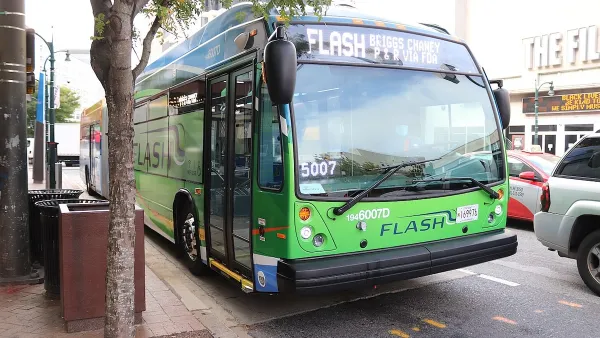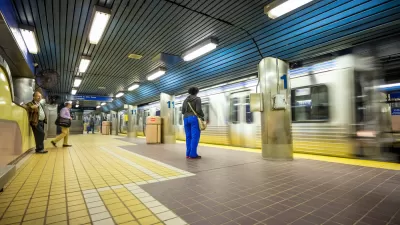Jean-Francois Mayet, the mayor of Châteauroux, introduced free ridership in a bid to turn around his town's failing transit system. Eleven years later, total ridership has increased 208 percent. Henry Grabar examines whether free transit is scalable.
Châteauroux isn't the first city to offer free public transportation, but it's the first example of a large city to do so. Henry Grabar observes, "the otherwise ordinary French town has become a canary in the coal mine of transportation policy, closely watched by the dozens of other municipalities in various stages of free transit experiments." A French report [PDF] released this year found that per person ridership in Châteauroux is up from 21 to 61 trips a year; and the city turned a profit in '03, '04, '05, and '07, after eliminating bus fares in 2001.
"The motivations for making a transit system free are obvious," writes Grabar. "Increased ridership can relieve traffic, improve the environment, boost the system's efficiency, give residents more spending money, help the poor, and rejuvenate central business districts." The results of free mass transit in Châteauroux have been positive, but "[t]here were growing pains: the number of slashed or tagged seats grew from a dozen in 2001 to 118 in 2002. Drivers complained that passengers treated the bus like a personal car, expecting to be dropped off at their doorsteps."
Bruno Cordier, author of a 2007 report Totally Free Mass Transit [PDF], attributes Châteauroux's success to not only free ridership, but also the simultaneous expansion of its transit network. He cautions that "[g]ratuity alone does not make the network attractive" and argues that "the system won't work at all in big cities, where 30-40 percent of transit revenue comes from ticket sales, as opposed to a mere 14 percent in Châteauroux."
The demonetization of the transit system in Aubagne (pop 100,000) has also proven successful, but the verdict on whether the same can happen in big cities will soon be put to the test. "At the end of this year," reports Grabar, "Tallin, Estonia (pop. 406,000) will eliminate fares on its transit system for residents, making it the world's biggest city with free mass transit."
FULL STORY: What Really Happens When a City Makes Its Transit System Free?

Maui's Vacation Rental Debate Turns Ugly
Verbal attacks, misinformation campaigns and fistfights plague a high-stakes debate to convert thousands of vacation rentals into long-term housing.

Planetizen Federal Action Tracker
A weekly monitor of how Trump’s orders and actions are impacting planners and planning in America.

San Francisco Suspends Traffic Calming Amidst Record Deaths
Citing “a challenging fiscal landscape,” the city will cease the program on the heels of 42 traffic deaths, including 24 pedestrians.

Defunct Pittsburgh Power Plant to Become Residential Tower
A decommissioned steam heat plant will be redeveloped into almost 100 affordable housing units.

Trump Prompts Restructuring of Transportation Research Board in “Unprecedented Overreach”
The TRB has eliminated more than half of its committees including those focused on climate, equity, and cities.

Amtrak Rolls Out New Orleans to Alabama “Mardi Gras” Train
The new service will operate morning and evening departures between Mobile and New Orleans.
Urban Design for Planners 1: Software Tools
This six-course series explores essential urban design concepts using open source software and equips planners with the tools they need to participate fully in the urban design process.
Planning for Universal Design
Learn the tools for implementing Universal Design in planning regulations.
Heyer Gruel & Associates PA
JM Goldson LLC
Custer County Colorado
City of Camden Redevelopment Agency
City of Astoria
Transportation Research & Education Center (TREC) at Portland State University
Jefferson Parish Government
Camden Redevelopment Agency
City of Claremont





























